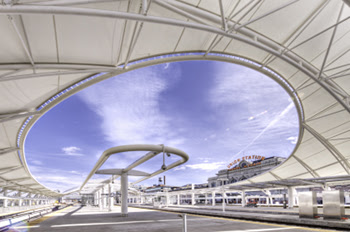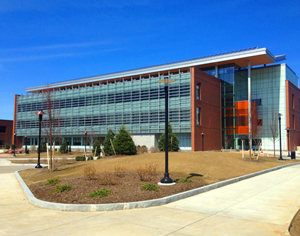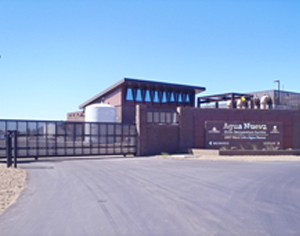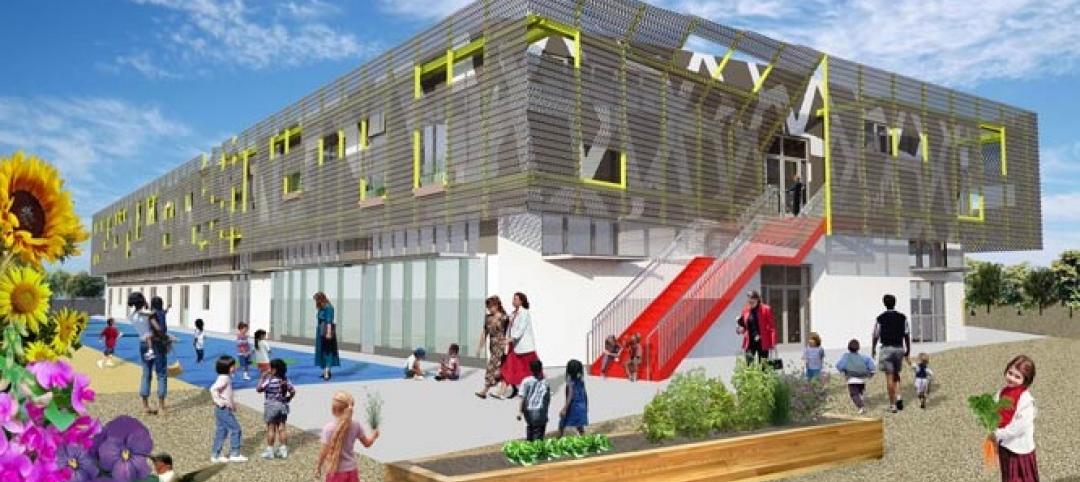The Design Build Institute of America (DBIA) has announced the 2014 Project of the Year and National Award of Excellence winners.
The Denver Union Station Transit Improvement Project has been bestowed with DBIA's highest honor, Project of the Year, with Agua Nueva, Golisano Institute for Sustainability, Henry M. Jackson Federal Building Modernization, and the San Diego International Airport Terminal 2 and Airside Expansion projects being specially recognized for excellence in the critical areas of design, process and teaming.
"This year's award competition was the most rigorous to date with a greater emphasis on best practices and teamwork, as well as the successful delivery of the project," says Lisa Washington, CAE, DBIA's Executive Director/CEO.
Recognized for exemplary collaboration and integration in design-build project delivery, the award-winning projects were evaluated by a distinguished panel of industry experts. This year, 25 projects in nine categories were awarded National Awards of Merit.
One project in each of the nine categories was then considered for best in category as a National Award of Excellence winner along with Excellence in Design, Process and Teaming awards and Project of the Year. The selected projects showcase design-build best practices, in addition to achieving budget and schedule goals and exceeding owner expectations. All photos courtesy of DBIA.
DBIA 2014 Project of the Year – Denver Union Station Transit Improvements Project
(pictured above)
The Denver Union Station Transit Improvements Project transformed 20 acres of blighted former rail yards into the vibrant centerpiece of a bustling downtown Denver, anchoring and facilitating connections between the region's transit system with all modes of public transit: an iconic, eight-track commuter rail train hall, new light-rail station and an airy, airport-like underground bus concourse with 22 bays for regional and commercial bus service. At $374.8 million and spanning 20 acres and seven city blocks, it is the largest multimodal project to seek LEED Silver certification from the USGBC. The project is a Public-Private Partnership (P3) successfully delivered under a design-build contract model.
The Project of the Year team includes: Owner: Denver Union Station Project Authority; Design-Builder, Construction Manager: Kiewit; Architect: Skidmore, Owings, and Merrill LLP; Engineer: AECOM; BIM Specialist/Construction: Legacy Mechanical Inc.; and Specialty Consultant: Hargreaves Associates.
"The remarkable Denver Union Station Project is a shining example of what can be accomplished through Design-Build Done Right," says Lisa Washington. "The project team truly took integrated project delivery to the next level by releasing design packages in alignment with construction activities, embedding lead architects and engineers in the contractors' offices and through weekly owner/architect/contractor meetings to ensure key decision-makers were frequently engaged. We could not be more proud to present this prestigious award to the Denver Union Station Project Authority and the entire project team as DBIA's 2014 Design-Build Project of the Year."
DBIA 2014 Excellence in Design – Golisano Institute for Sustainability and the Governor George Deukmejian Courthouse
The Golisano Institute for Sustainability at Rochester Institute of Technology (RIT) in Rochester, N.Y., wanted a signature building that would serve as a living laboratory for scientific discovery and experimental learning that could serve as the Western Gateway to RIT. The result is an 84,000-square-foot complex, comprised of a four-story research and three-story academic and office building connected by a four-story galleria. It houses laboratories, classrooms and office space, with high-performance design features that make it a living laboratory of sustainability. The Golisano Institute is among the first in the world to offer a Ph.D. program in sustainability.
The Governor George Deukmejian Courthouse was delivered through a unique Public-Private Partnership and is the first social infrastructure project in the United States procured under the principles of Performance-Based Infrastructure contracting. Constructed in downtown Long Beach, Calf., the design-build team successfully delivered the spectacular 545,000-square-foot courthouse and 399,000-square-foot parking facility 11 days ahead of schedule.
DBIA 2014 Excellence in Process – Agua Nueva Water Reclamation Facility
The Pima County Regional Wastewater Reclamation Department embarked on the largest capital program in its history, which includes the $172 million Agua Nueva Water Reclamation Facility in Tucson, Ariz. The 32-million-gallon-per-day facility produces A+ quality effluent and features state-of-the-art odor control technology. Key challenges were meeting stringent contractual/permit effluent requirements and compliance schedules, coordinating shutdown of the old facility with Agua Nueva startup, maintaining strong coordination with other projects and optimizing capital and life-cycle costs.
DBIA 2014 Excellence in Teaming – Henry M. Jackson Federal Building Modernization
The Henry M. Jackson Federal Building modernization in Seattle, Wash., served to reduce the building's energy consumption by 30 percent, increase the Energy Star score to 97 and achieve a LEED-EB Silver certification from the USGBC through multiple energy-related scopes. After shortlisting to three firms, cost and schedule were fixed to enable the teams to focus on innovative solutions to energy savings. To ensure accountability, the GSA used a performance guarantee that included one year of monitoring the Energy Use Intensity against goals established by the design-build teams, for which $1.8 million was held as retention.
DBIA 2014 National Award of Excellence by Category winners are:
• Aviation – The San Diego International Airport Terminal 2 and Airside Expansion, San Diego, Calif.
• Civic – FY11 228 PN UEPH Schofield Barracks, Fort Shafter, Oahu, Hawaii
• Commercial/Office – Wendell August, Grove City, Pa.
• Education – Golisano Institute for Sustainability Research Building, Rochester, N.Y.
• Healthcare – California Health Care Facility Stockton, Stockton, Calif.
• Industrial/Process/Research – Rolls-Royce Advanced Aerofoil Machining Facility, Prince George County, Va.
• Rehabilitation/Renovation/Restoration – Henry M. Jackson Federal Building Modernization, Seattle, Wash.
• Transportation – Denver Union Station Transit Improvements, Denver, Colo.
• Water/Wastewater - Agua Nueva Water Reclamation Facility, Tucson, Ariz.
Related Stories
| Feb 15, 2011
Iconic TWA terminal may reopen as a boutique hotel
The Port Authority of New York and New Jersey hopes to squeeze a hotel with about 150 rooms in the space between the old TWA terminal and the new JetBlue building. The old TWA terminal would serve as an entry to the hotel and hotel lobby, which would also contain restaurants and shops.
| Feb 15, 2011
New Orleans' rebuilt public housing architecture gets mixed reviews
The architecture of New Orleans’ new public housing is awash with optimism about how urban-design will improve residents' lives—but the changes are based on the idealism of an earlier era that’s being erased and revised.
| Feb 15, 2011
LAUSD commissions innovative prefab prototypes for future building
The LA Unified School District, under the leadership of a new facilities director, reversed course regarding prototypes for its new schools and engaged architects to create compelling kit-of-parts schemes that are largely prefabricated.
| Feb 15, 2011
New 2030 Challenge to include carbon footprint of building materials and products
Architecture 2030 has just broadened the scope of its 2030 Challenge, issuing an additional challenge regarding the climate impact of building products. The 2030 Challenge for Products aims to reduce the embodied carbon (meaning the carbon emissions equivalent) of building products 50% by 2030.
| Feb 15, 2011
New Urbanist Andrés Duany: We need a LEED Brown rating
Andrés Duany advocates a "LEED Brown" rating that would give contractors credit for using traditional but low cost measures that are not easy to quantify or certify. He described these steps as "the original green," and "what we did when we didn't have money." Ostensibly, LEED Brown would be in addition to the current Silver, Gold and Platinum ratings.
| Feb 15, 2011
AIA on President Obama's proposed $1 billion investment in energy conservation
The President’s budget increases the value of investment in energy conservation in commercial buildings by roughly $1 billion, reports AIA 2011 President Clark Manus, FAIA. The significant increase from the current tax deduction of $1.80 per sq. ft. now on the books is an increase for which the AIA has been advocating in order to encourage energy conservation.
| Feb 14, 2011
Sustainable Roofing: A Whole-Building Approach
According to sustainability experts, the first step toward designing an energy-efficient roofing system is to see roof materials and systems as an integral component of the enclosure and the building as a whole. Earn 1.0 AIA/CES learning units by studying this article and successfully completing the online exam.
| Feb 11, 2011
Four Products That Stand Up to Hurricanes
What do a panelized wall system, a newly developed roof hatch, spray polyurethane foam, and a custom-made curtain wall have in common? They’ve been extensively researched and tested for their ability to take abuse from the likes of Hurricane Katrina.

















